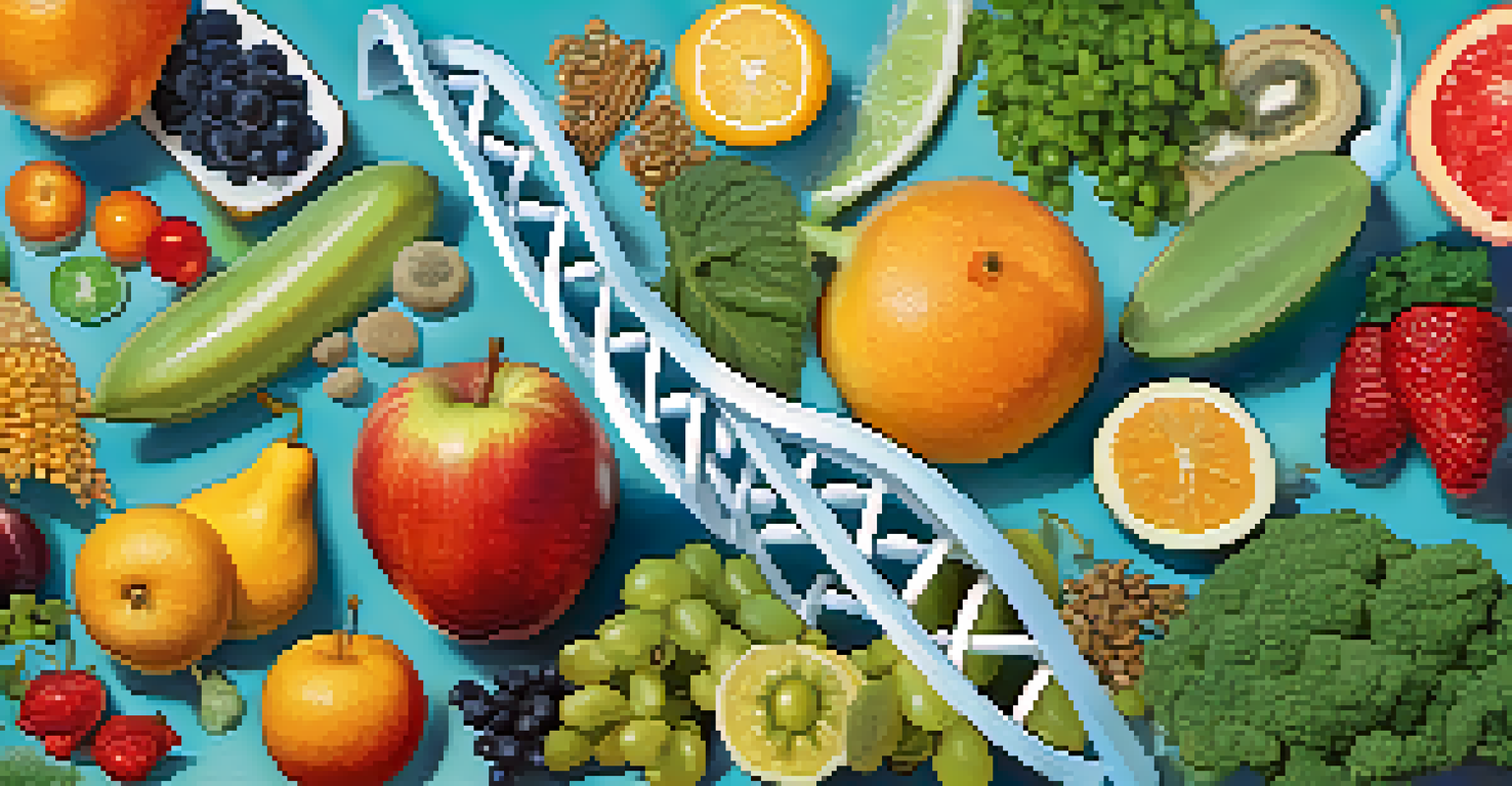The Future of Nutrigenomics: Trends and Innovations Ahead

Understanding Nutrigenomics and Its Importance
Nutrigenomics is the study of how our genes interact with the foods we eat. This fascinating field explores the relationship between diet and gene expression, helping us understand how nutrition can influence health outcomes. As we delve deeper, we uncover the potential for personalized nutrition tailored to our unique genetic makeup.
Let food be thy medicine and medicine be thy food.
Imagine being able to eat in a way that maximizes your health based on your individual DNA. This is the promise of nutrigenomics, which can help address various health issues, from obesity to chronic diseases. By understanding our genetic predispositions, we can make informed dietary choices that may enhance our well-being.
As research in this area expands, we are likely to see more tools and resources available that help individuals make nutrition choices aligned with their genetic profiles. This shift towards personalized nutrition could revolutionize the way we approach diets and health management.
Emerging Technologies in Nutrigenomics
The landscape of nutrigenomics is rapidly evolving, thanks to advancements in technology. Innovations like DNA sequencing and bioinformatics are paving the way for more accessible genetic testing. With these tools, individuals can gain insights into their nutritional needs based on their unique genetic profiles.

For instance, companies are now offering at-home genetic testing kits that provide personalized dietary recommendations. These kits analyze specific genes related to metabolism and nutrient absorption, allowing users to tailor their diets for optimal health. It's like having a personal nutritionist in your pocket!
Nutrigenomics Personalizes Nutrition
Nutrigenomics explores the interaction between our genes and diet, paving the way for personalized nutrition tailored to individual genetic profiles.
As technology continues to advance, we can expect even more sophisticated tools that make it easier to understand how our genes influence our health. This accessibility will likely lead to a broader adoption of nutrigenomic principles, making personalized nutrition the norm rather than the exception.
The Role of Big Data in Nutrigenomics
Big data is transforming many industries, and nutrigenomics is no exception. The collection and analysis of vast amounts of genetic and nutritional data allow researchers to uncover patterns and trends that were previously invisible. This wealth of information can lead to more accurate predictions regarding how specific foods affect different individuals.
The future of medicine will be based on the science of nutrigenomics — understanding how our genes influence our response to food and nutrition.
By harnessing big data, scientists can identify correlations between genetic markers and dietary responses, enhancing our understanding of personalized nutrition. This could lead to the development of tailored dietary plans that consider not just individual genetics but also lifestyle factors and environmental influences.
As more data becomes available, we can expect nutrigenomics to evolve into a highly precise science. This will enable healthcare professionals to provide more effective dietary recommendations, ultimately improving public health outcomes.
Trends in Personalized Nutrition Programs
Personalized nutrition programs are gaining traction, driven by the desire for tailored health solutions. More health and wellness companies are offering customized meal plans based on genetic testing results. This trend reflects a growing awareness that one-size-fits-all diets may not be effective for everyone.
These programs often combine genetic insights with lifestyle and health data to create a comprehensive dietary approach. Imagine a meal plan designed specifically for you, considering your genetic predispositions, food preferences, and health goals. This personalized approach can lead to more sustainable dietary changes and better long-term health outcomes.
Big Data Enhances Dietary Insights
The use of big data in nutrigenomics allows for the identification of patterns that enable more accurate dietary recommendations based on genetic information.
As the demand for customized nutrition grows, we can expect to see more innovation in this field. Companies are likely to develop more user-friendly platforms that make it easy for individuals to access their genetic data and receive tailored nutrition advice.
The Impact of Nutrigenomics on Chronic Disease Management
Chronic diseases such as diabetes, heart disease, and obesity are major public health challenges. Nutrigenomics offers a promising avenue for managing these conditions by providing insights into how diet can influence gene expression related to disease. This could lead to more effective dietary interventions tailored to individual needs.
For example, individuals with a genetic predisposition to high cholesterol may benefit from specific dietary changes that target their unique risk factors. By understanding the genetic basis of their condition, patients can work with healthcare professionals to develop personalized nutrition strategies that support better health outcomes.
As nutrigenomics continues to advance, we may see a shift in how chronic diseases are managed, moving from a reactive to a proactive approach. This could empower individuals to take charge of their health through informed dietary choices.
Ethical Considerations in Nutrigenomics
As with any emerging science, nutrigenomics raises important ethical questions. One major concern is the potential for genetic data misuse, leading to issues related to privacy and discrimination. As individuals begin to share their genetic information for personalized nutrition, ensuring that this data is protected is crucial.
Additionally, there are concerns about access to nutrigenomic testing and personalized nutrition services. If these resources are only available to those with financial means, it could widen the health disparity gap. It's essential to advocate for equitable access to these innovations so that everyone can benefit from advancements in nutrigenomics.
Ethics in Nutrigenomics Matter
As nutrigenomics evolves, ethical concerns about genetic data privacy and equitable access to personalized nutrition services must be addressed.
As we navigate the future of nutrigenomics, addressing these ethical considerations will be vital. By fostering a dialogue around these issues, we can work towards a future where personalized nutrition is safe, accessible, and beneficial for all.
The Future Landscape of Nutrigenomics
Looking ahead, the future of nutrigenomics appears bright, with numerous innovations on the horizon. As research continues to unfold, we can expect to see more refined dietary recommendations based on genetic insights. This evolution promises to enhance our understanding of nutrition and its impact on health.
Moreover, the integration of artificial intelligence and machine learning into nutrigenomics research could lead to groundbreaking discoveries. These technologies can analyze complex data sets, identifying trends and correlations that can inform personalized nutrition strategies.

In summary, the future of nutrigenomics offers exciting possibilities for individuals seeking to optimize their health through personalized nutrition. As we embrace these innovations, we move closer to a world where dietary choices are tailored to our genetic blueprints, ultimately fostering better health for everyone.